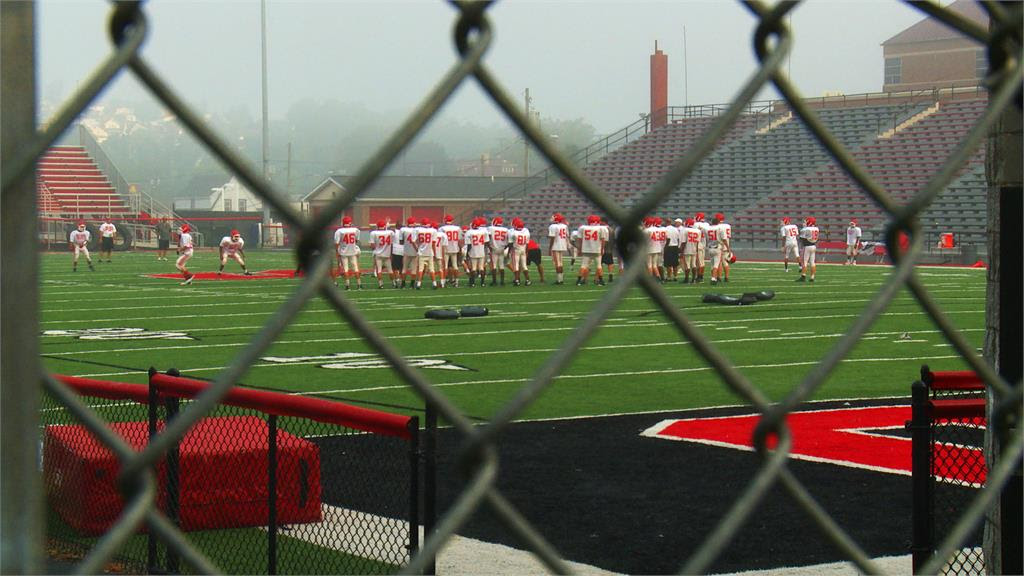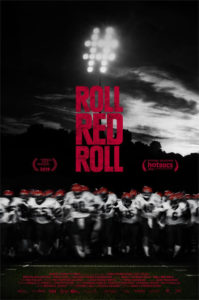
Roll Red Roll
Director and Producer: Nancy Schwartzman

The documentary Roll Red Roll handles a lot of different themes and topics. It deals with a horrible crime in a small town, the way that town deals with the crime, the part that social media plays in crime and justice, and how rape culture permeates our society as a whole. That’s a lot of heavy plates to keep spinning, but Nancy Schwartzman’s film does an admirable job of exploring these themes satisfactorily.
In 2012 there was a high school party in Steubenville, Ohio where a girl, Jane Doe, was raped. If you don’t have a clear memory of this news story you probably at least recall some details. Roll Red Roll goes through the night in question, the people involved and the unique way in which the case developed. It also goes into the sadly less unique way in which rape is considered and discussed in our society.
The case starts out in the stereotypical way you’d expect when small-town football players are accused of raping a girl at a party. Lots of disgusting talk of “boys will be boys” and victim blaming. This is especially disgusting coming from a local talk radio host who is clearly a piece of shit. I expect some wishy-washy “well what was she wearing?” kinda talk from the old white guys they talked to, but it was especially saddening and disheartening when an interview with teen girls turned into rape apology. Schwartzman does a good job of letting a subject’s words speak for themselves. When we see these two say that a victim has to take responsibility for their actions, it speaks volumes about the primitive language and ideas we still use and teach.
The most shocking and frustrating moment in the film comes about halfway through. It’s footage of the investigator on the case interviewing the suspects’ football coach. The coach swears up and down that the boys didn’t do it — he also mentions that he didn’t punish them for drinking. He didn’t want to make them look guilty, which is a whole other fucked up kettle of fish — but he says they may have “fucked” her, but they didn’t rape her. With an audible sigh, the lead investigator has to break down what rape is, going over penetration and consent and that a drunk person isn’t able to give consent. He literally has to teach a grown-ass man the definition of rape. It’s shocking in the sense that it’s such a bald-faced example of the failings of our society caught on film.
The conversation with the coach reminded me of a study in which the phrasing of a question — using the word “convince” or “coerce” instead of “rape” — almost triples the amount of respondents who would admit to sexual assault. We’re taught that rape is bad without actually being taught the context and culture around it. Rape is bad. Rapists are bad. So, if you’re a “good person” what you do couldn’t possibly be rape. This is backed up and perpetuated in a society that glorifies objectification, considers women property to be won or taken and continues to excuse wretched behaviour as “boys will be boys.” As long as we don’t use the word “rape,” then it’s okay because rape is bad. It’s a way to avoid a cultural re-evaluation, like refusing to call out racism as racism and racists as racist. Without a discussion of how these terrible concepts are ingrained into our society we don’t actually discuss or attempt to fix the problem, we just avoid the words.
The documentary veers away from what you’d expect when it brings social media into it. Alexandria Goddard was a blogger and true crime fan from the Steubenville area, and when she heard about the case she decided to look into it. She combed through countless Facebook and Twitter profiles and could practically put together a timeline of the events of the night. She published a story about the case on her blog, including social media screenshots, and kicked off a discussion and a backlash and an online crusade.
Schwartzman presents the social media aspect in a very engaging and easy to follow way. It reminded me of the 2015 documentary The Thread about Reddit’s reaction, for good and ill, to the Boston Marathon Bombing. There isn’t much discussion about the insensitivity displayed in tweets and comments (casually mentioning rape, calling Jane Doe a “dead body”) compared to how people would act “in real life.” I think that’s for the best. There isn’t that much difference. Filtering the thoughts through social media just seems to remove any learned politeness and cuts straight to the heart of the matter. Sexual assault and the need for consent aren’t treated seriously in real life, so why would these students comments or tweets or videos treat it seriously?
Roll Red Roll definitely left me wanting more, in a good way. It’s a large issue, not something that can be fully-explored in a single documentary. Schwartzman and her crew do a great job of focusing on the important parts of the Steubenville case in an engaging way without being exploitative. There’s a scene later on in the film where a series of women of all ages spoke up about their own experiences with rape and sexual assault that is handled well and incredibly moving. See this movie, talk about this movie, talk about these issues.
Verdict: Watch this. It isn’t so overwhelmed by the severity of the subject matter that it becomes a chore to sit through. Schwartzman is a great filmmaker and knows how to keep the story moving while giving time for details and moments to sink in. It’s a film that will stick with me for a while, which always makes for an easy recommendation.

![[REVIEW] STRAY DOGS #2](https://geekd-out.com/wp-content/uploads/2021/03/F3A9A79A-1393-480D-86BB-7D64DD44FCAA-150x150.jpeg)
![[PODCAST] THE COMICS AGENDA:THE MANDALORIAN AND WONDER WOMAN REVIEW](https://geekd-out.com/wp-content/uploads/2017/11/comics-agenda-2-150x150.jpg)
